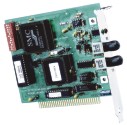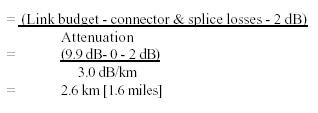© 2013 Uwe Wannags Hard-+ Software Distribution e.K (SWD)
COR-CT-N128
Corman Technologies CT-N128
CorNet ARCNET Adapter PC Fiber ST 820nm QNX

| DESCRIPTION | |
| This is an ARCNET fiber optic adapter for QNX 2 and QNX 4 networks. The CorNet ARCNET Adapters - Fiber Optic offer high resistance to radio frequency interference. This is due to glass fiber being used as the medium to transmit the data packets across the network. Since glass is an insulator rather than a conductor of electric current, this medium cannot be affected by "noise" from other electrical sources, such as motors, radio transmitters, or lightning. With fiber optics, light is the source of energy that permits this transmission of data. | |
| OPERATING ENVIRONMENT | |
| Power: | +5V DC +/-5% @ 0.5A maximum (240 mA typical) |
| Operating Temperature: | 0 to +55ºC |
| Storage Temperature: | -40 to +125ºC |
| Humidity: | 5% to 80% (non-condensing) |
| ARCNET LAN INTERFACE | |
| Two ST connectors | |
| 820nm to 850nm | |
| Modified Token Passing Local Area Network | |
| 2.5 Megabaud transmission rate | |
| Supports up to 255 nodes | |
| Requires only 8 kbytes of Address Space | |
| IBM PC, XT, AT and compatible | |
| Switch selectable memory map base address (CC00,CE00,DC00,DE00,EC00,EE00) | |
| Menu selectable node ID and interrupt level (levels 2,3,4,5,6 & 7) | |
| 2 KB dual ported RAM buffer for high speed interleaved message transfer | |
| Software reset capability | |
| Optical Power Budget: | |
 |
|
| PHYSICAL SPECIFICATIONS | |
| Short length 8 Bit ISA Bus Card ( 4.97" long ) | |
| Switch selectable memory map base address | |
| green LED indicates that the network is operating normally | |
| red LED indicates node activity | |
| INSTALLATION CONSIDERATIONS | |
| Fiber Optic Cable Type | Dual Fiber |
| Graded Index (Multi-Mode) | |
| 62.5/125µm or 100/140µm | |
| ST connectors | |
| Cable specifications include a standard connector loss for both ends of a single cable. It is recommended to allow 2dB of loss to allow for dirt and cracks in the connectors for any given link. Each fusion splice typically adds 0.25 dB loss, and barrel connector splices are the sum of the barrel connector and two end connector losses. All these factors result in loss along the line and must be considered. | |
| Maximum Distance per Segment | |
| A segment is the cable between two hubs or a hub and a card on the network. The maximum length of a segment of fiber optic cable is dependent on the quality, size, connectors, splices and rating of the fiber optic cable. The most important fiber optic cable specification is the attenuation per kilometer. In combination with the link budget shown previously, the maximum segment length can be calculated. | |
| For example, consider a fiber optic cable with the following specifications: | |
| -62.5/125µm | |
| -Maximum attenuation 3.0 dB/Km | |
| -No splices in entire cable length | |
| -ST connectors on both ends | |
| -Grade F, OFNR (UL Listed Riser) | |
| -850 nm | |
| From the Optical Power Budget chart the minimum Link Budget is 9.9 dB. Allowing the recommended 2 dB margins, the maximum segment length is then: | |
| Max. Segment Length |  |
| Maximum Network Span | |
| The maximum span defines the longest signal path length between any two nodes in the network. This determines the maximum end to end propagation delay. ARCNET controller chips have several internal timers based on the maximum propagation delay for a particular timeout level. A signal is allowed to pass through up to ten hub delays plus 2000ft [609m] of a coax cable at each segment to determine the standard propagation delay times. This becomes 22,000ft. [6705m] for a coax network. Since the velocity of propagation is lower in fiber optic cable, the network span is reduced. The maximum span for a network connected entirely with fiber optic cable using standard time-outs is approximately 18,500 ft. [5600 meters]. | |
| CONFORMS TO THE FOLLOWING STANDARDS | |
| ARCNET: | ANSI 878.1 |
| EMC: | EN 50082-1 (Immunity) |
| IEC 801-2:1991 | |
| 4KV Contact, 8KV Air | |
| IEC 801-3:1984 | |
| 3V/m | |
| IEC 801-4:1988 | |
| 0.5 KV Signal line, | |
| 1 KV Power line | |
| European CE compliance | |
Rev: 01/14
 Did you forget your password?
Did you forget your password?


